Multiple Choice
Identify the
choice that best completes the statement or answers the question.
|
|
|
Political Machines Run the
Cities
In the late 19th
century, cities were in trouble. Rapid growth, inefficient government, and a climate of Social
Darwinism opened the way for a power structure, the political machine, and a new politician, the city
boss.
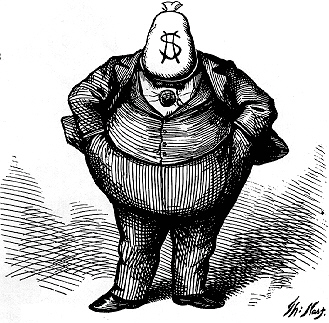
Boss Tweed
THE POLITICAL MACHINE
A political machine was an organized group that
controlled the activities of a political party in a city and offered services to voters and
businesses in exchange for political or financial support. In the decades after the Civil War,
political machines seized control of local government in major cities such as Baltimore, New York,
Philadelphia, Boston, and San Francisco.
The political machine was organized like a pyramid.
At the pyramid's base were local precinct workers and captains, who worked to gain voters'
support on a city block or in a neighborhood and who reported to a ward boss. At election time, the
ward boss worked to secure the vote in all the precincts in the ward, or electoral district. In
return for their votes, people received city jobs, contracts, or political appointments. Ward bosses
helped the poor and gained their votes by doing favors or providing services. As Martin Lomasney,
elected ward boss of Boston's West End in 1885, explained, "There's got to be in every
ward a guy that any bloke can go to ... and get help-not justice and the law, but
help."
At the top of the pyramid was the city boss. The boss controlled the activities of
the political party throughout the city. Like a finely tuned machine, precinct captains, ward bosses,
and the city boss worked together to elect their candidates and guarantee the success of the
machine.
| |
|
|
|
1.
|
The political machine
........
a. | offered services to
voters | d. | received financial
support | b. | offered favors to voters and businesses | e. | all of these are true | c. | received political support
|
|
|
|
2.
|
Political machines
a. | were only active in the Northeast
cities | c. | took control of most major cities in
the U.S. | b. | were active only in hte Midwest cities | d. | had little political power |
|
|
|
3.
|
Political machines were
organized
a. | with democratic and free
elections | c. | from the bottom
up | b. | in a democratic manner with local
committees voting for the people who ran the machine | d. | with the most powerful politician at the top and organized down to the voters
at the bottom. |
|
|
|
4.
|
What opened the way for the
growth of political machines in the big cities in the late 1800’s?
a. | fast growth of the
cities | d. | answers a, b, and c are
correct | b. | government that was not efficient | e. | answers a and b are correct but not c | c. | the idea of Social Darwinism (only the stongest people in
society are meant to survice) |
|
|
|
5.
|
Political machines controlled
the political parties in the big cities after the Civil War.
|
|
|
THE ROLE OF THE POLITICAL BOSS
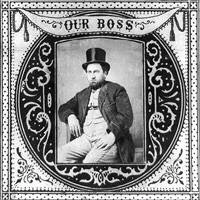
A city boss controlled thousands of municipal jobs,
including those in the police, fire, and sanitation departments. Whether or not the boss officially
served as mayor, he controlled business licenses and inspections and influenced the courts and other
municipal agencies. Bosses like Roscoe Conkling in New York used their power to build parks, sewer
systems, and waterworks and gave money to schools, hospitals, and orphanages. Bosses could also
provide government support for new businesses, a service for which they were often paid extremely
well.
It was not only money that gave city bosses the drive to deal with urban issues. By
solving problems, bosses could reinforce voters' loyalty, win additional political support, and
extend their influence.
Mr. Schneemann grew up in a city, Philadelphia, controlled by a
Democrat political machine. No one ever paid traffic tickets. If a voter got a ticket, he simply took
it to his local ward boss and the ticket was taken care of. At Christmas the ward boss distributed
food baskets to the poor. If a person wanted a job with the city he did not stand in a line at the
city employment office, He simply went to see his ward boss, who gave him a note to take to city hall
where he was hired. What did the ward boss want in return? At election time everyone in the ward
voted for the Democrat candidates so our political machine could stay in power. Political machines
put a personal face on city government.
| |
|
|
|
6.
|
By controlling city jobs the
political machine enhanced its
a. | image with the
voters | d. | all of
these | b. | political power | e. | none of these | c. | voter loyalty |
|
|
|
7.
|
The political boss and his
machine
a. | was fair to
everyone | d. | none of these are
true | b. | gave supporters preferential treatment | e. | all of these are true | c. | did not
discriminate |
|
|
|
8.
|
At the turn of the century the
cities were filled with immigrants who had many problems. One of the reasons political bosses became
so powerful was because they helped people to solve their problems.
a. | false, the bosses stole from the
immigrants | c. | false, the bosses
only cared about the rich people who lived in the cities | b. | the statement is true | d. | false, the bosses did not really have much
power |
|
|
|
IMMIGRANTS AND THE POLITICAL
MACHINE
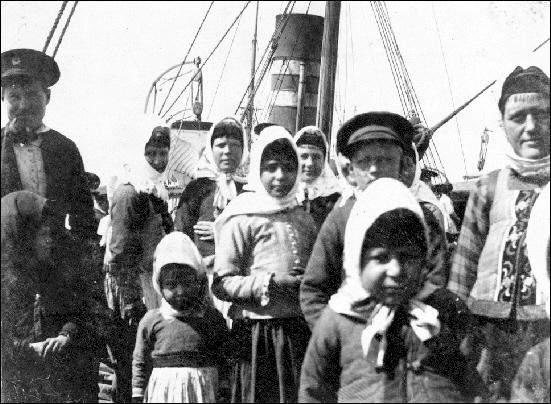
Immigrants received sympathetic understanding from
the political machines and in turn became loyal supporters. Many political bosses were
first-generation or second-generation immigrants who had been raised in poverty. Few were educated
beyond grammar school. They entered politics early and worked their way up from the bottom. They
could speak to immigrants in their own language and understood the challenges that newcomers faced.
The bosses not only understood the immigrants' problems but were able to provide solutions. The
machines helped immigrants become naturalized, find places to live, and get jobs-the newcomers'
most pressing needs. In return, the immigrants provided what the political bosses needed
most-votes.
"Big Jim" Pendergast, an Irish-American saloonkeeper, worked his way up
from precinct captain to Democratic city boss in Kansas City by aiding Italian, African-American, and
Irish voters in his ward. By 1900, he controlled Missouri state politics as well, because he
effectively gathered political support.
| |
|
|
|
9.
|
Immigrants
a. | fought against the political
machines | c. | ignored the
political machines | b. | supported political machines | d. | were persecuited by the political
machines |
|
|
|
10.
|
Most political
bosses
a. | were college
educated | c. | started out as
poor immigrants and understood the needs of immigrants | b. | rich upper class
industrialists | d. | did not communicate with immigrants
and only wanted their money |
|
|
|
11.
|
"Big Jim" Pendergast,
was a political boss in
a. | Philadelphia and Kansas
City | c. | Chicago and Kansas
City | b. | Ireland and Kansas City | d. | Kansas City and Missouri |
|
|
|
Municipal Graft and
Scandal
Although the
well-oiled political machines provided city dwellers with vital services, many political bosses fell
victim to greed and corruption as their power and influence grew.
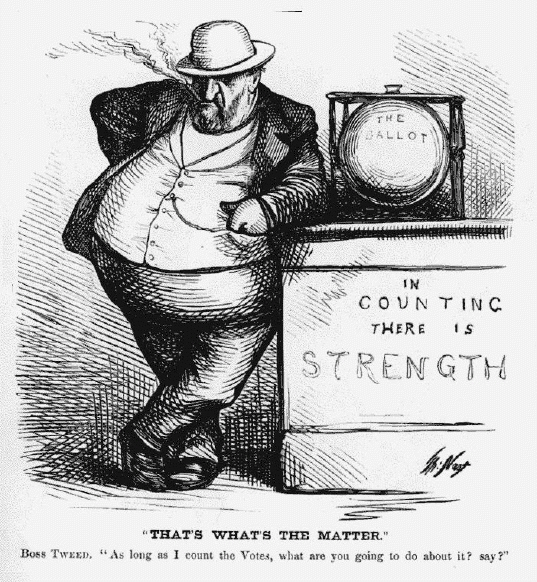
ELECTION
FRAUD AND GRAFT
Since the power of political machines and the loyalty of voters were not
always enough to carry an election, some political machines turned to fraud. They padded the lists of
eligible voters with the names of dogs, children, and people who had died. Then, under those names,
they cast as many votes as were needed to win. In a Philadelphia election, for example, a precinct
with 100 registered voters returned 252 votes.
Once a political machine got its candidates
into office, it could take advantage of numerous opportunities for graft. For example, after hiring a
person to work on a construction project for the city, a political machine could ask the worker to
turn in a bill that was higher than the actual cost of materials and labor. The worker then
"kicked back" a portion of the earnings to the machine. Taking these kickbacks, or illegal
payments, for their services made many political machines-and individual politicians-very
wealthy.
Other ways that political machines made money were by granting favors to businesses
in return for cash and by accepting bribes to allow illegal activities, such as gambling, to
flourish. Politicians were able to get away with shady dealings because the police rarely interfered.
Until about 1890, police forces were hired and fired by political bosses.
| |
|
|
|
12.
|
Political machines
a. | believed in fairness and refused to
fix elections | c. | fixed elections
and did what they needed to do, legal or not, to win | b. | did not tamper with elections because they supported the
idea of democracy | d. | did not base their power on
elections |
|
|
|
13.
|
Political
machines
a. | rigged
elections | d. | helped the people
in their wards | b. | took pay-off from businesses for contracts | e. | all of these are true | c. | used municipal jobs to enhance
power |
|
|
|
14.
|
The political bosses took
kick-backs from workers. A kick-back is
a. | legal in most cities
today | c. | a form of
taxation | b. | a form of graft | d. | a social service |
|
|
|
15.
|
One of the reasons politicians
were able to get away with illegal activities was because
a. | there were no laws against
graft | c. | the politicians did not really
engage in graft | b. | the police were hired and fired by the
politicians | d. | graft is not a form of
stealing |
|
|
|
THE TWEED RING SCANDAL
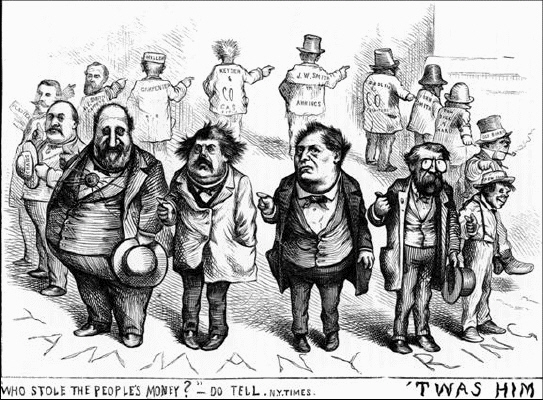
William Marcy Tweed, one of the earliest and most
powerful bosses, became head of Tammany Hall, New York City's powerful Democratic political
machine, in 1868. Between 1869 and 1871, the Tweed Ring, a group of corrupt
politicians led by Boss Tweed, pocketed as much as $200 million from the city in kickbacks and
payoffs. One scheme involving extravagant graft was the construction of the New York County
Courthouse, which cost taxpayers 811 million. The actual construction cost was $3 million; the
rest of the money went into the pockets of Tweed and his followers.
The widespread, profound
graft practiced by Tammany Hall under Boss Tweed's leadership gradually aroused public outrage.
Thomas Nast, a political cartoonist, ridiculed Tweed in the New York Times and in
Harper's Weekly. Nast's work particularly angered Tweed, who reportedly said,
"I don't care what the papers write about me-my constituents can't read; but ... they
can see pictures!"
The Tweed Ring was finally broken in 1871. Tweed was indicted
on 120 counts of fraud and extortion, and in 1873 he was sentenced to 12 years in jail. After
serving two years of his sentence, Tweed escaped. He was later captured in Spain when Spanish
officials identified him from a Thomas Nast cartoon. By that time, corruption had become an issue in
national politics.
| |
|
|
|
16.
|
Boss Tweed
a. | was a political machine
boss | d. | all of these are
true | b. | was governor of New York | e. | none of these are true | c. | a New York church
reformer |
|
|
|
17.
|
Tammany
Hall
a. | was the name for a New York reform
group | c. | was a “gay nineties”
music hall | b. | was a name for the New Youk political
machine | d. | a sports
arena |
|
|
|
18.
|
The Tweed
Ring
a. | was a group of honest business
leaders in New York | c. | was a group of
corrupt political machine leaders led by Boss Tweed | b. | was a group of Republicans loyal to Abraham
Lincoln | d. | Boss Tweed’s poker playing
buddies |
|
|
|
19.
|
In the early 1900s, political
machines tended to exist in urban areas.
|
|
|
20.
|
In the early 1900s, immigrants
tended to oppose political machines.
|
|
|
21.
|
Political machines were
organized like a pyramid, with local precinct captains at the bottom, ward bosses in the middle, and
city bosses at the top.
|
|
|
22.
|
Bribery is any type of
unethical or illegal use of political influence for personal gain.
|
|
|
23.
|
A kickback is a type of illegal
payment.
|
|
|
24.
|
New York’s powerful
political machine, known as the Mafia, was run by William Marcy Tweed and the members of the Tweed
Ring.
|
Matching
|
|
|
a. | Thomas
Nast | e. | kickback | b. | Tweed Ring | f. | Tammany Hall | c. | immigrants | g. | Irish Americans | d. | political machine | h. | graft |
|
|
|
25.
|
illegal payment of a portion
of ones earnings to someone else
|
|
|
26.
|
Group of corrupt politicians
led by Boss Tweed
|
|
|
27.
|
A powerful political machine
in New York
|
|
|
28.
|
A group that controlled a
political party
|
|
|
29.
|
Poloitical Cartoonist who
ridiculed Boss Tweed
|
|
|
30.
|
Illegal use of political
influence for personal gain
|